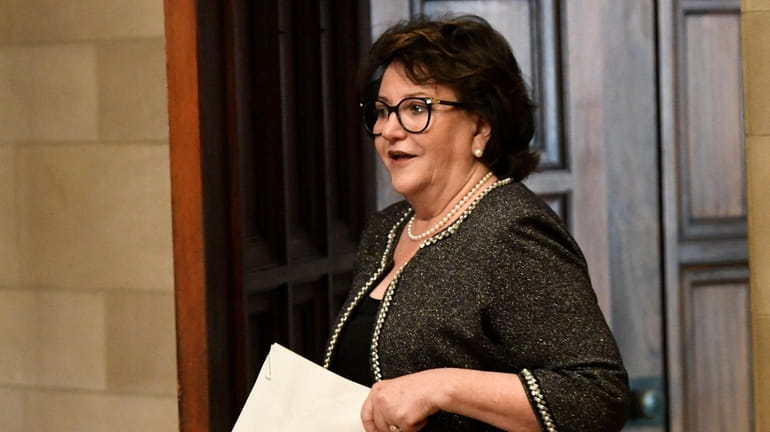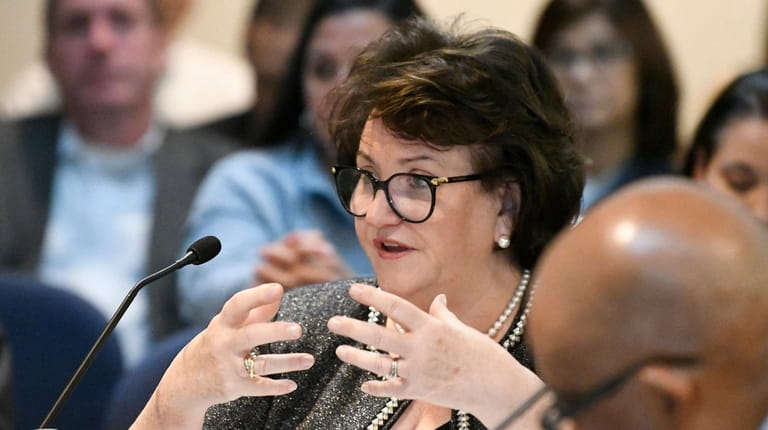NY education commissioner is resigning

State Education Commissioner MaryEllen Elia arrives Monday at a news conference in the Education Department building in Albany to announce her resignation, effective Aug. 31. Credit: Hans Pennink
ALBANY — State Education Commissioner MaryEllen Elia is resigning as of Aug. 31 and plans to work for an unnamed national company that provides services for students, she said Monday after giving notice verbally and in a letter to a stunned Board of Regents.
Elia, who has led the department since July 2015 and was the first woman in the position, told reporters later in the day that she takes pride in her efforts to ease tensions over a controversial and unpopular program of state tests and teacher evaluations that was launched before she took office.
As the state's chief school officer, she made a point of crisscrossing New York, talking to local parents, teachers and school officials and visiting with students.
"I think one of the things that frustrated people most here is they felt we weren't listening," Elia said. "I would suggest to you that I listened."
She gave the letter to Regents Chancellor Betty Rosa and other members of the policymaking panel at their meeting in the state capital, the group's final session before its usual August recess. The announcement came at the end of the board's morning meeting.
Elia, in response to a question later in the day, said she hopes to visit the 7,600-student Hempstead district one more time before she leaves office, to talk to school trustees and others about attempts to boost the system's financial accountability and academic achievement with the help of special adviser Jack Bierwirth, whom she appointed in 2017. The district has been classified for years as being in the bottom 5 percent statewide in academic performance.
The commissioner said she had not discussed her plan to resign with Rosa or any individual board members because she wanted the entire group to hear the news at the same time.

State Education Commissioner MaryEllen Elia, right, talks with well-wishers after submitting a letter of resignation from the post, effective Aug. 31, at Monday's meeting of the state Board of Regents in Albany. Credit: Hans Pennink
“We were all very, very surprised,” said Roger Tilles of Great Neck, who represents Long Island on the 17-member panel. “She’s been on Long Island, talking and listening more than any commissioner I know.”
He praised her work on several projects, including revisions of the controversial Common Core academic standards, which the Regents have renamed the Next Generation Learning Standards and are continuing to revamp.
“However, in recent months there have been several differences of opinion with the Regents, both in substance and process," Tilles said. "I assume this contributed to her decision. But she wasn’t forced out — that’s for sure.”
One recent controversy involved the release of updated guidance from Elia’s department aimed at ensuring that student instruction in nonpublic schools is substantially equivalent to that of public schools. Many Catholic and Orthodox Jewish educators complained that the guidance was overly intrusive, and some Regents said privately that they were not consulted in advance on the details.

State Education Commissioner MaryEllen Elia speaks to members of the state Board of Regents on Monday in Albany during a discussion of state graduation requirements. Credit: Hans Pennink
In her resignation letter, Elia did not give a reason for her departure. She told reporters she had been offered a position by a national company involved in work with students. She said the firm, which she did not name, would announce the appointment later.
"Going forward, I hope to translate the experiences I've gained from one of the largest, most complex education systems in the country into lessons to help improve classrooms, schools and districts for students in every state," she wrote in her letter.
Rosa and the Regents board, in a statement, thanked the commissioner for her "tireless and unwavering service" and for "placing the interests of students first."
Elia, 70, a New York native, became the state's first female education commissioner when the Regents voted for her appointment in May 2015 at an annual salary of $250,000, since raised to $304,000. When chosen, the veteran educator most recently had run the school system in the Tampa area for a decade before being forced out on a divided vote of the Hillsborough County school board.
She came to New York at a fractious time, after former commissioner John B. King Jr. had departed for a post in the U.S. Education Department following controversy stemming from the state's rapid implementation of the Common Core Learning Standards and related curriculum changes.
As part of that fallout, Elia and the Regents have grappled with teachers' vocal opposition to performance evaluations and mass student boycotts of state tests in English Language Arts and math given in grades three through eight — an opt-out movement that had its beginnings on Long Island in spring 2013 and mushroomed statewide in spring 2015 into the nation's largest such grassroots revolt.
Long Island remains the epicenter of test refusals in New York, with an average of nearly half of all students eligible to take the ELA and math exams opting out in every test season since.
New York State United Teachers, the state's largest educators union, said in a statement Monday that it looks forward to working with the next commissioner in fixing "the broken state testing system."
In December 2015, the Regents imposed a four-year moratorium on use of students' standardized test scores on teacher job ratings — a moratorium that was extended later until June 2020. Legislation passed in the spring and signed by Gov. Andrew M. Cuomo eliminated a requirement that at least 50 percent of public schoolteachers’ ratings be based on their students' scores on state tests.
Instead, the law requires local districts to negotiate with their teacher unions to choose the exams to be used in judging the educators' performance. As in the past, about half of job ratings will be based on test scores and about half on classroom observations by district supervisors and outside experts.

